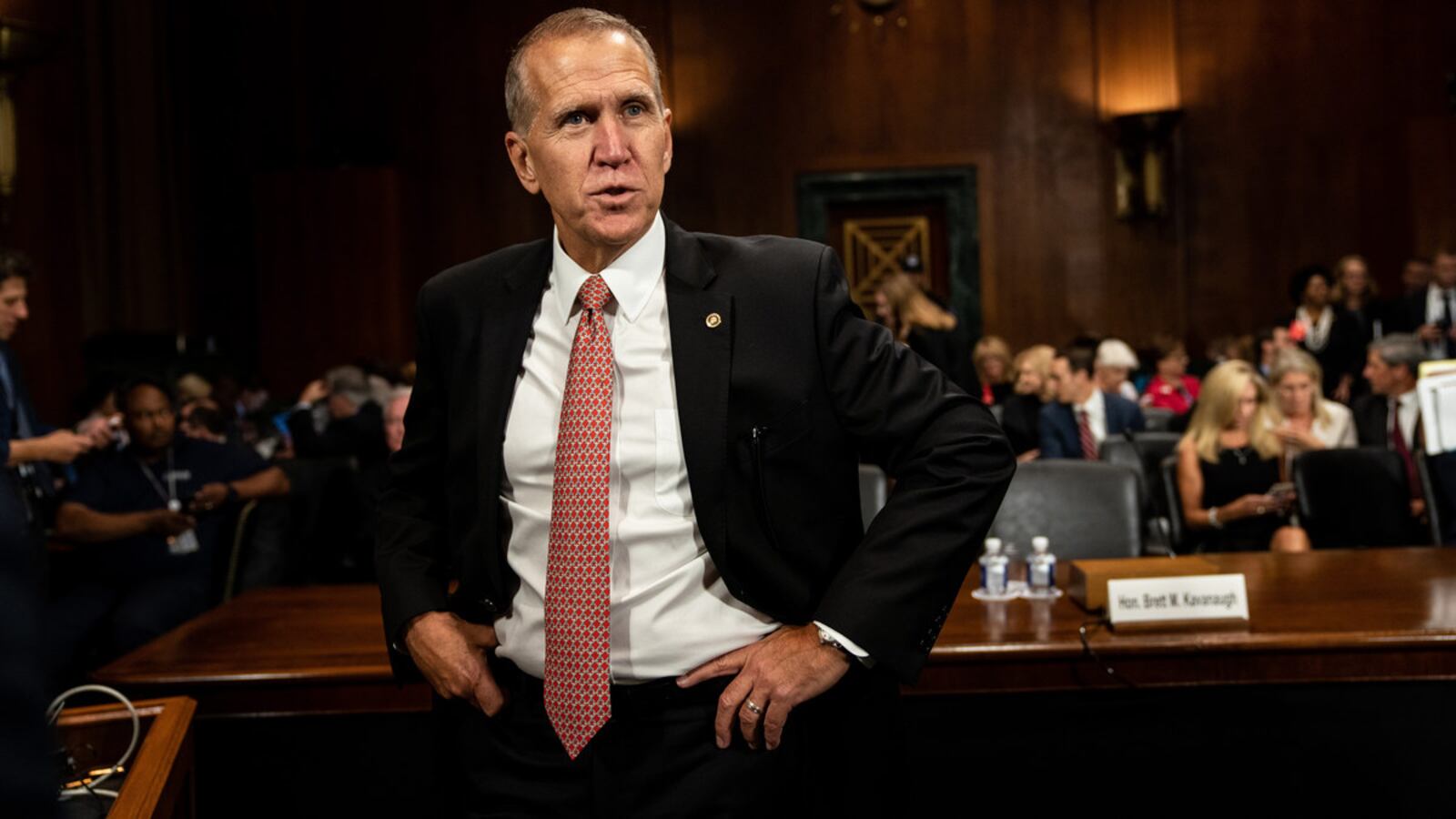Republican Senator Thom Tillis is a loud voice in committee hearings, pushing the Obamagate conspiracy and reading aloud the dictionary definitions of “witch hunt” and “hoax.”
But that’s not what he talks about at home in North Carolina, running for re-election. His first television ad has him walking through a trailer park recalling his humble roots (the spot is titled “Humble”) and pledging to be a fighter for workers, protecting their jobs as the economy recovers.
His family moved around a lot, he was one of six children, and he worked his way through college. Good for him. But he’s been in Washington for six years, and whoever put the ad together probably didn’t notice Tillis is wearing a $110 Tommy Bahama polo shirt.
“He’s trying to reinvent himself right before an election by focusing on his humble roots but he has consistently voted against policies that would help folks move up the economic ladder, move up the education ladder,” says Morgan Jackson, a political strategist in Raleigh. “It’s not just where you came from, it’s what you do with it.”
A second ad, “Pay Day,” has Tillis walking behind the counter of a restaurant with burgers on the grill reminiscing about his days as a short-order cook and saying that he’s fighting for the people “forgotten by our politics.”
Forgotten by whose politics? Control of the U.S. Senate is at stake, and Tillis is one of the most vulnerable senators. He’s perhaps best known for getting lots of money from big pharma, big oil, big banks and payday lenders, and for pushing their preferred policies. A Morning Consult poll last year had him with the lowest approval rating of any senator, at 34 percent.
His biographical ads are a belated attempt to get voters to like him. But which voters? He’s had a troubled relationship with President Trump, and was twice booed at a Trump rally, most recently in March of this year.
He had to go full Trump to win his primary on Super Tuesday, and now he’s trying to boost rural turnout by convincing those voters that he’s one of them.
As Trump’s numbers tank, Tillis is keeping his head down, not taking sides between the governor and the president over holding the GOP Convention in Charlotte, even praising Democratic Governor Roy Cooper for his go-slow approach to opening up the economy. But Tillis can’t escape from his past—or from his present—as an anti-Obamacare Republican who bragged that he “stopped Medicaid cold” when he was speaker of the North Carolina legislature.
“When he talks about humble roots and where he comes from, he’s taken more money from the pharmaceutical industry than any other member of Congress,” Morgan Jackson told The Daily Beast, repeating “than any other member of Congress,” and pointing out the implications of that financial backing for where his interests might lie, for example, on lowering the cost of prescription drugs, a major issue for voters, or treating opioid addiction.
As an up-and-coming Republican before Trump, Tillis boasted he was a RINO, recasting the label as Republicans In Need of Outcomes. His outcomes generally favor the well-heeled and corporate interests. Only 7 percent of his first quarter campaign contributions this year came from small donations. He worked to get “struggling” pharmaceutical companies access to taxpayer funds in the CARES Act program, which was meant for small businesses.
When oil prices dropped, Tillis wrote a letter to the administration urging there be no “oil and gas bias” when distributing economic relief funds. After a White House summit with the industry on April 3, Tillis received over $60,000 in corporate PAC checks from companies that had attended the summit.
Payday lenders have been a pet project of Tillis’ going back to his days as a state lawmaker. As speaker of the North Carolina House in 2013, he received more than $30,000 from the industry, the most of any legislator in the state. Once in Washington, he continued his alliance with this industry which is always under fire because of its usurious interest rates. In a March 10 Senate Banking committee hearing, Tillis fended off allegations that payday lenders might prey on people hard hit by the coronavirus. “As a kid who grew up on 90-day notes with my dad,” Tillis warned against “overreach” or “painting with a broad brush” an industry he regards as a lifeline. Within days of the hearing, he had received more than $20,000 from four major payday lenders.
A day after a group of 24 bipartisan attorney generals, including North Carolina AG Josh Stein, wrote a letter opposing a new “Rent-A-Bank” rule that would benefit payday lenders, Tillis received $12,500 from the industry and consumer finance companies confident he will fight their battles in Washington.
When the big banks were sued by small business owners for prioritizing their corporate clients in granting government relief funds, Tillis took in more than $43,000 from the corporate PACs of the banks named in the lawsuit—Bank Of America, JPMorgan Chase, U.S. Bank, and Wells Fargo—saying he didn’t see any evidence they were favoring big business over small business.
“This guy is pretty much the epitome of a weather vane,” says Tom Mills, founder and publisher of PoliticsNC.com, a website of commentary and analysis. “He got elected as a moderate out of Charlotte to the state legislature in 2006. He’s a cyclist. He was living in Cornelius, a small town, and he ran because he wanted more bike trails, not the typical profile of a Republican legislator.”
He rose to become speaker in a chamber increasingly dominated by Tea Party Republicans, not an easy fit for the Mister Establishment that Tillis had become. He’d always been better at seeking the next office than knowing what to do once he was there, so he took a flyer and challenged Democrat Kay Hagan in 2014, capitalizing on a late Ebola scare and videos of ISIS members beheading Americans. It was a banner year for Republicans, yet he only won by 1.7 percentage points.
He wasn’t much of a presence in Washington until he wrote an op-ed in February 2019 that appeared in The Washington Post saying he supported Trump’s border control policies but opposed the president’s national emergency declaration as a way to get money for his wall. Trump trashed Tillis on Twitter and vowed to recruit someone to run against him in the GOP primary.
In March 2019, 12 Senate Republicans joined the Democrats to block Trump’s emergency declaration. Tillis wasn’t one of them. It was a major capitulation and one of the few things that voters know for sure about Tillis. It would have diverted millions in projects replacing aging infrastructure on the state’s military bases. Politifacts declared it a “Full Flop” on its Flip-O-Meter.
Jessica Taylor with the Cook Political Report, a bipartisan newsletter, says Tillis’ ads set up a contrast to portray Democratic challenger, Cal Cunningham, a lawyer, former state senator and veteran who served in Iraq and Afghanistan, as “entitled.” Cook rates the race a tossup, and Edwards notes that Tillis could pull fewer votes than Trump.
North Carolina is the only battleground state with a competitive Senate seat and governor’s race. Cook rates incumbent Roy Cooper’s bid for re-election as leaning Democratic.
“In a race like this (Tillis v Cunningham), as long as neither side does anything disastrous, it comes down to the political environment,” says Mills. “And if Joe Biden wins North Carolina, Cal Cunningham’s the senator from North Carolina. And if Trump wins by a point, Tillis has a shot. If Trump wins by half a point, then it’s hard to know.”






